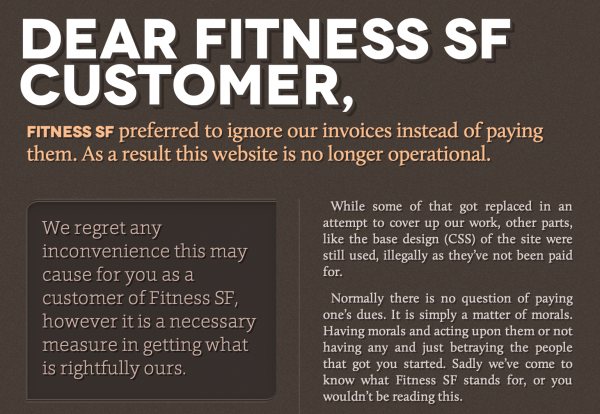This is a co-written piece by Chris Lema and Shane Pearlman. Shane is a partner at Modern Tribe Inc. and leads indie teams in UX/UI, web, mobile & product design. In his spare time, Chris coaches startups on new product development.
It took Boeing 8 months to pay up the first time I worked with them. eBay took nearly 6 months once and SAP wasn’t far behind that. When you are hustling and trying to make sure that your family is cared for, being a freelancer can be glorious, and it can be a hairball of stress. Since 2001, Chris has been stiffed once and I’ve only been stiffed twice.
The questions is, how do you avoid getting into a bad situation in the first place, and when it happens, what are your options? This whole discussion came out of a series of tweets Chris & I saw a few days ago.
The Smackdown
You’re a web developer who can’t get the attention of your client. You send invoices. You send reminders. You did the work but now they’re not responding and all you have is their initial down payment.
You start getting angry because you know you’re being ignored. What do you do?
If you’re mad enough, you might post a tweet like this:
I bet these bastards still think I won’t fight back and let them get away with betraying me and escaping payment.But first, coffee.
— Frank Jonen (@frankjonen) February 14, 2013
And soon, you might follow it up with this:
https://twitter.com/frankjonen/status/301894155204964354
And eventually, as you get a few tweets that cheer you on, you’re on a high that’s driving an emotional decision – something we’ve all been through.
You take down their web site and replace it with a message to your client’s clients.

So here’s the question – just because you can punch their lights out, should you?
We’re not talking about legal rights. We’re not lawyers, but we’d sure hope before you go apeshit and take down their site, you’ve checked and know you’re covered.
Heck, we’re not even talking about your ethical rights, because taking back your work product from someone who isn’t paying doesn’t seem like much of a moral challenge.
We’re talking about the impact. The trust equation. After all, you are in business and at the end of the day, all you have is your reputation.
Here are three reasons why taking over someone’s site for non-payment will end up hurting more than helping you. You are clearly telling future clients:
1. you don’t know how to process conflict professionally and in private.
2. you let emotion rule you.
3. you didn’t have a great work agreement to start with.
There’s very little upside to the action except for the emotional pleasure of defacing the site – which will wear out quickly.
Now to be clear, we’re not judging Frank as a human being. His situation plainly sucks. But if you’re in his shoes and wondering what to do, let us propose some ideas. Hopefully, in the comments you can add a few more.
Some practical tips protecting you from non-paying customers
- Choose clients carefully: http://tri.be/should-you-take-the-gig/
- Wear protection: http://tri.be/update-the-shane-peter-inc-contract/
- Stop offering stuff for free: http://jamesdalman.com/why-you-shouldnt-offer-web-design-services-for-free/
- Write proper invoices: http://www.smashingmagazine.com/2009/11/05/invoice-like-a-pro/
- Have a process: http://www.sitepoint.com/how-to-deal-with-non-paying-clients/
- Marry your clients: http://alistapart.com/article/marry-your-clients
- Don’t create a hostage situation: http://chrislema.com/where-is-your-focus/
- Send them to Collections: http://freelanceswitch.com/the-business-of-freelancing/collections-guide/
Some things to remember
Some folks will recommend providing a discount as an incentive to pay you early. Chris found that the result can often be a discounted payment that arrives late. So he doesn’t recommend it. I personally think its a viable approach.
Also, you may threaten legal services. Two things to note – if you threaten it, be prepared to act. This isn’t the time to bluff. Secondly, make sure you do the math, because your legal fees may be more than what you’re suing for (and just because you win a judgement doesn’t mean you can force payment). Don’t forget to look at the contract carefully.
The heart of the matter is often a calculation between the real cost, the emotional cost and the reward. Can you make more money spending that time with a new customer than on chasing the delinquent funds? The key is to create a process, know when to stop work, be friendly yet persistent.
With larger companies, we’ve discovered the problem often lies with bureaucracy rather than ill-will. Making a friend often works much better than being adversarial. Make sure you learn their process. Figuring out how to navigate the corporate financial back alleys is worth its weight in gold.
Remember, you aren’t alone and the industry itself is trying to figure out how to handle the problems of unpaid wages.
Both of us have taken a hit and moved on. In other situations, we’ve sent emails and made calls. In one case, after nearly 6 months of being ignored, I sent it to collections. We now have a lien on the dude’s house. Will it pay out? I kind of doubt it, but it was a satisfying day in small claims court.
So, how have you dealt with vagrant clients? Do you think Frank was right in his approach?

16 Comments
Join the conversation